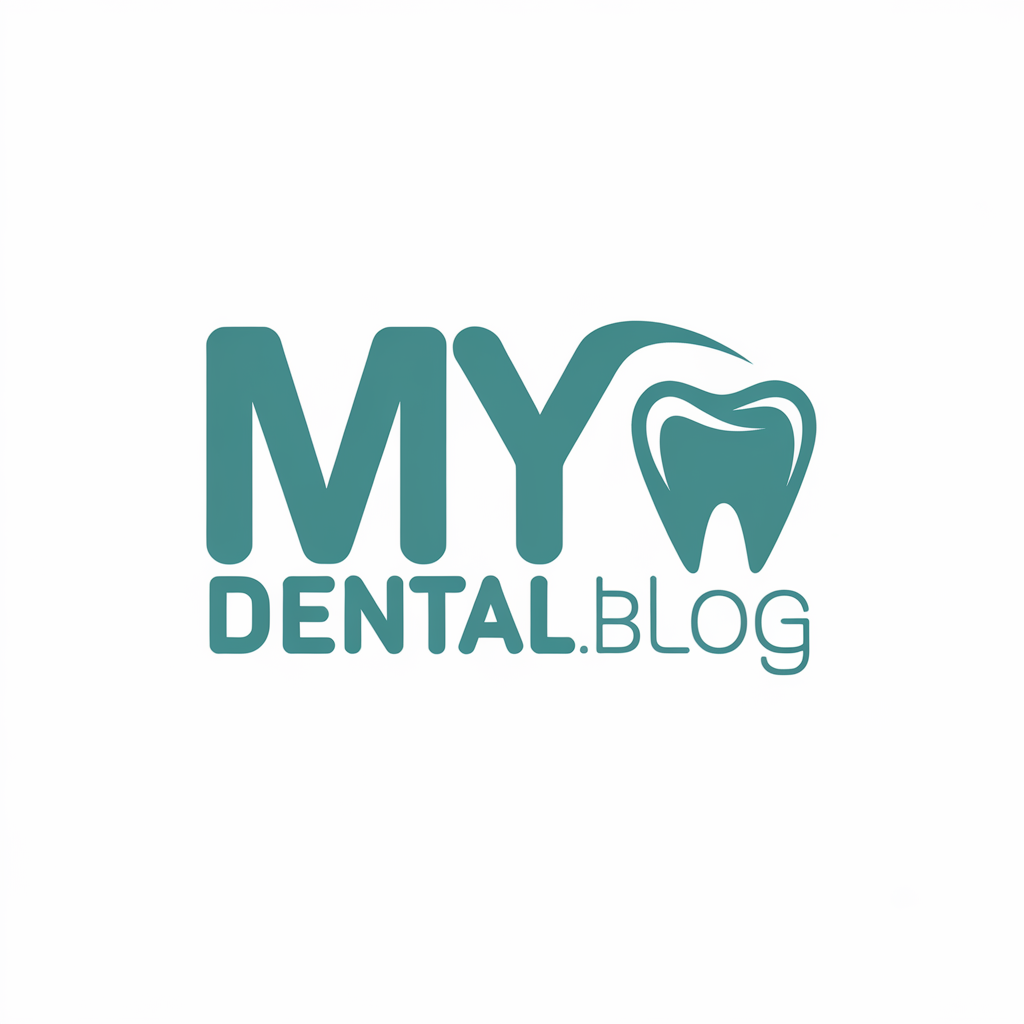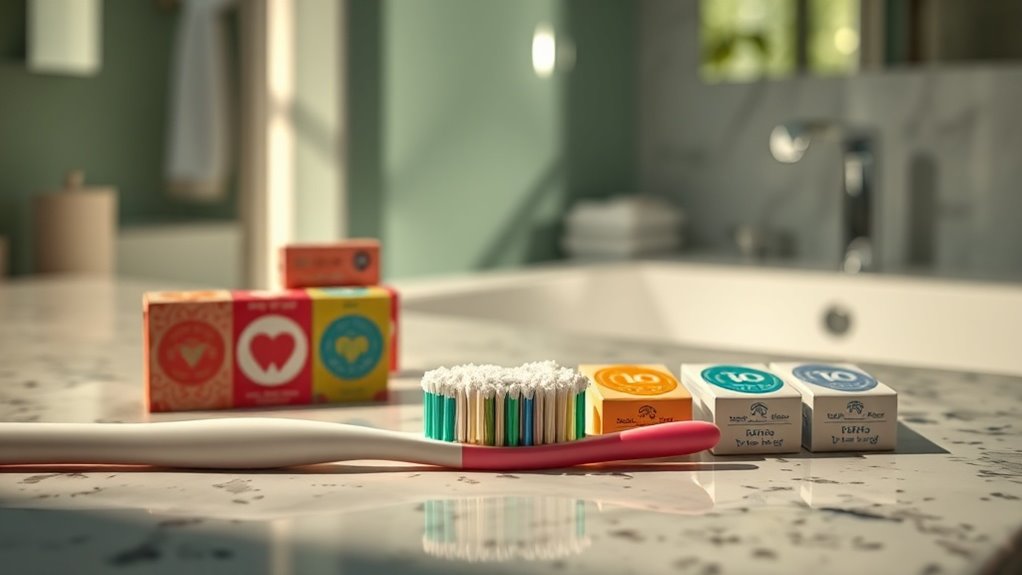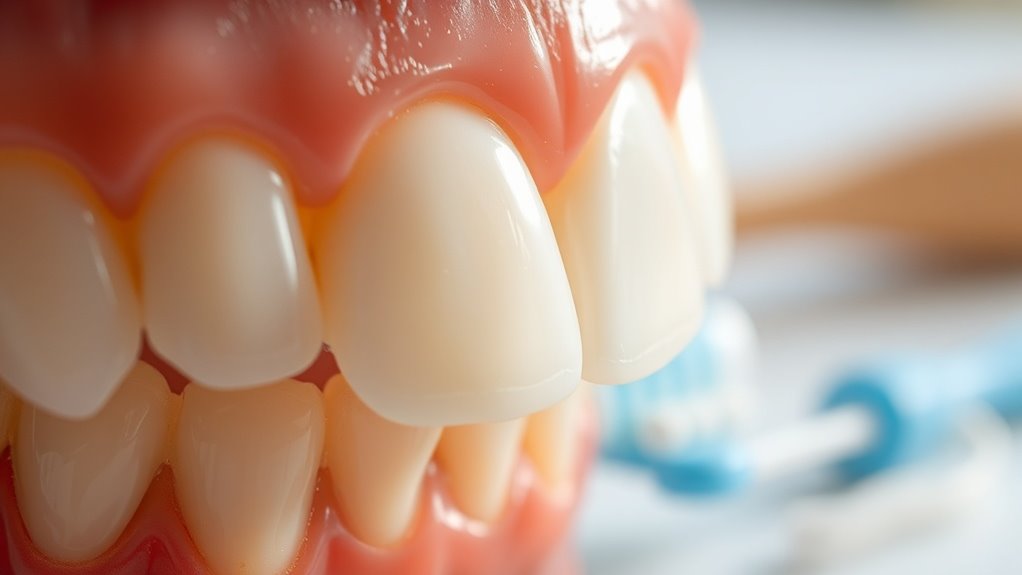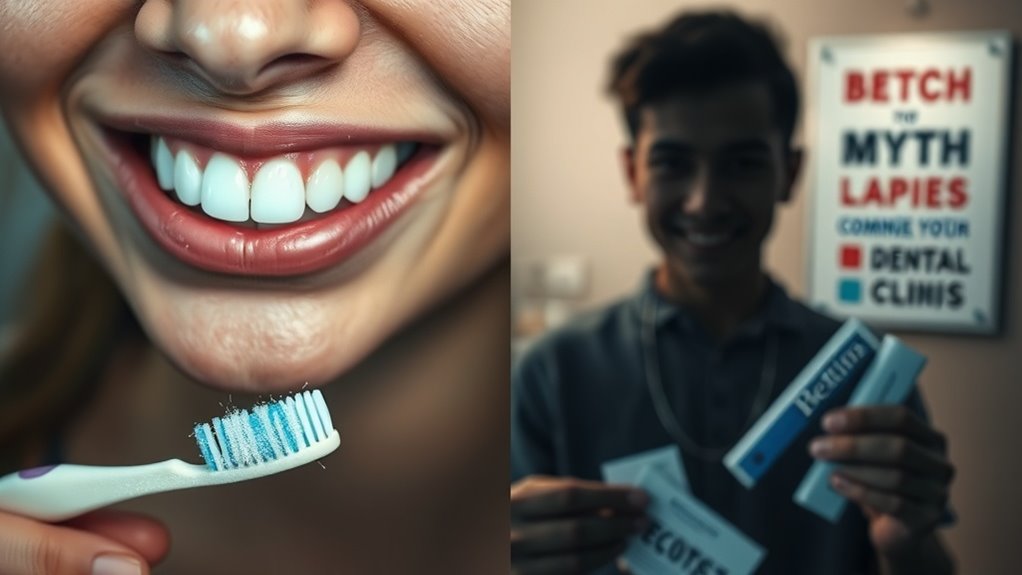Busting Common Myths About Dental Care
Like an old wives’ tale, many myths about dental care persist, influencing your oral hygiene practices. You might think that brushing harder or skipping dental visits is acceptable. Or perhaps you believe sugar alone is to blame for cavities. Understanding the truth behind these common misconceptions can reshape your approach to oral health and prevent problems down the line. Are you ready to uncover the realities that could change your dental care routine?
Brushing Harder Cleans Better
Many people believe that brushing harder equates to a more thorough cleaning of the teeth.
However, dental myths explained show that excessive pressure can actually harm your gums and enamel.
Gentle, consistent brushing with the right technique effectively removes plaque and reduces the risk of cavities.
Focus on technique rather than force to guarantee ideal dental health without causing damage. Proper brushing techniques involve minimal pressure and circular motions for effective cleaning.
You Only Need to See a Dentist When Something Hurts
While it’s common to think you only need to see a dentist when you’re in pain, this belief can lead to significant dental problems going unnoticed.
Routine check-ups allow for early detection of issues like cavities, gum disease, and oral cancer. Preventive care saves you from more extensive treatments later on. Regular visits can help early spotting of issues that may save costs on procedures later on.
To maintain ideal oral health, schedule regular dental visits, regardless of discomfort.
Sugar Is the Sole Cause of Cavities
While it’s common to think sugar is the sole culprit behind cavities, that’s an oversimplification. Bacteria in your mouth also contribute greatly, and the frequency of sugar intake can exacerbate the issue. In addition, your overall diet impacts dental health, making it essential to take into account more than just sugar when addressing cavity prevention. Maintaining good oral hygiene practices is crucial for reducing the risk of cavities.
Bacteria Play a Role
Though sugar is often blamed for cavities, it’s essential to recognize that bacteria play a significant role in this dental concern.
Specifically, harmful bacteria metabolize sugars, producing acids that erode tooth enamel. This process highlights the importance of maintaining oral hygiene to control bacterial growth.
Regular brushing and flossing can help minimize these bacteria, ultimately reducing your risk of developing cavities.
Frequency Matters More
Many people mistakenly believe that sugar alone causes cavities, but the frequency with which you consume sugary foods and drinks plays an essential role in dental health.
Frequent exposure to sugars creates a continuous acidic environment in your mouth, allowing decay-causing bacteria to thrive. Reducing the number of times you eat sugary snacks can considerably lower your cavity risk and enhance oral health.
Diet’s Broader Impact
Although sugar is often blamed as the sole culprit for cavities, it’s essential to recognize that a broader dietary context considerably influences oral health.
Factors like acidic foods, balance of nutrients, and overall eating patterns play significant roles. A diet rich in vitamins, minerals, and fiber can strengthen enamel and promote salivary function, effectively reducing cavity risk when combined with proper oral hygiene practices.
Whitening Treatments Damage Your Teeth
While you might’ve heard that whitening treatments can harm your teeth, this claim often oversimplifies the issue.
When used correctly and under professional supervision, whitening treatments are generally safe.
However, excessive use or improper application can lead to enamel sensitivity.
It’s crucial to consult your dentist to guarantee you choose appropriate products and methods to maintain dental health while achieving desired brightness. Additionally, professional whitening methods often minimize side effects and ensure gum and enamel health, making them a safer choice.
Gum Disease Is Only an Issue for Older Adults
You might believe gum disease only affects older adults, but that’s a misconception.
In reality, early onset can occur at any age, often linked to poor oral hygiene and lifestyle factors. Research indicates that individuals with gum disease are 2-3 times more likely to experience heart attacks or strokes, highlighting the importance of understanding these risks for maintaining your dental health.
Early Onset Risks
How can gum disease affect younger individuals? Gum disease can develop at any age, and its onset isn’t restricted to older adults.
Factors like poor oral hygiene, smoking, and hormonal changes can increase risks in younger populations. Untreated gum disease may lead to tooth loss, and systemic health issues, such as cardiovascular problems, potentially manifesting earlier than expected.
Regular dental check-ups are essential for prevention.
Impact of Poor Hygiene
Many people mistakenly believe gum disease only affects older adults, yet poor oral hygiene can trigger serious dental issues in younger individuals as well.
Neglecting proper brushing and flossing leads to plaque buildup, causing gum inflammation and, eventually, periodontal disease.
Early intervention is vital, as untreated gum disease can result in tooth loss and other health complications, regardless of your age.
You Should Avoid Flossing if Your Gums Bleed
Although bleeding gums can be alarming, avoiding flossing isn’t the solution.
In fact, gentle flossing can help remove plaque and promote gum health.
Bleeding often indicates gum inflammation, which can improve with consistent care.
If bleeding persists, consult your dentist for advice tailored to your situation.
Maintaining a proper routine is essential for preventing further complications related to gum disease. Consistent oral hygiene practices can prevent gum disease and lessen bleeding gums occurrence.





